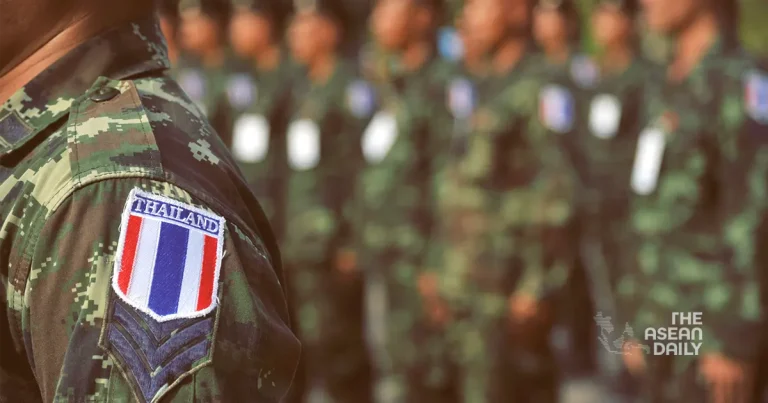21-6-2024 (BANGKOK) Thailand’s long-standing political rivals are once again engaged in a power struggle, this time over the impending military promotions scheduled for July. The battle lines are drawn between the royalist-military faction and the Pheu Thai party, founded by former Prime Minister Thaksin Shinawatra.
The outcome of this tussle could determine whether one side gains influence over the military, a crucial factor in governing a country that has experienced 19 coups or attempted coups since 1932.
The royalist-military faction, consisting mainly of senior military figures and palace loyalists, is determined to retain control over the military’s annual promotions, according to military and intelligence sources. They believe that accomplishing this will help them maintain a degree of authority, even after last year’s general elections ushered in a civilian-led government after nearly a decade of two pro-royalist, military-dominated regimes.
“The conservative old guard is still in control of the defense sector and will flex its muscle to remain on top,” said a senior military figure anonymously. “The royalist-military faction knows they are more powerful.”
The clash over naming new commanders comes as the camps are already at odds on security-related matters.
The other side, the civilian-led Pheu Thai party, which heads the 10-month-old coalition government, has attempted to assert its authority over the defense establishment with mixed success. During an April cabinet reshuffle, Pheu Thai prevented a senior general from the royalist-military camp from being named deputy minister of defense. However, in May, Pheu Thai acquiesced to the navy’s pressure to endorse a deal for a controversial Chinese-made submarine despite concerns over its new engine’s perceived poor quality.
Thaksin Shinawatra, Pheu Thai’s de facto leader, understands the importance of maintaining influence within the military after his return from 15 years of self-imposed exile last August. According to senior Pheu Thai sources, he has begun to “weigh in on defense-related issues.”
“He is still the most influential figure in the country,” a Thaksin confidant told Nikkei, “and if he wants to change the direction of the country, he knows he needs to deal with the defense forces.”
However, seasoned military analysts believe that Pheu Thai’s hand has been weakened by Thaksin’s inability 10 months ago to appoint a trusted senior military ally as the deputy prime minister for security affairs, a position often held by a retired general who coordinates relations between the prime minister’s office and the armed forces.
The government’s latest pick for the position, Phumtham Wechayachai, a senior Pheu Thai politician and commerce minister, has proven counterproductive. According to Paul Chambers, an expert on Thai national security at Naresuan University, “the military leadership despises him.”
This tension has even surfaced over the government’s efforts to shape a Myanmar policy in response to the worsening civil war in its northwestern neighbor. The army has signaled that it has its own views, which differ from the plans of the Pheu Thai-led administration.
The hostility between the royalist-military faction and Thaksin, or more broadly Pheu Thai, is now being discussed among influential circles in Bangkok. On the agenda is the collapse of a so-called “secret deal” that was reportedly struck on a Malaysian resort island in May 2023, according to political insiders and Bangkok-based diplomatic sources familiar with the details.
Thaksin, then living in exile in Dubai, was one of four people who participated in those talks, meant to pave the way for his return home. The agreement was for his Pheu Thai party to support the incumbent pro-military parties in forming a civilian government after the elections later that month. In return, the then 73-year-old tycoon agreed to retire from politics.
According to multiple sources, the other three participants were a business tycoon, a senior military figure, and a staunch champion of the royalist-military camp. Since his return, Thaksin has barely concealed his political interventions on multiple fronts, reportedly angering members of the royalist-military faction who had initially backed the secret deal.
“He was expected ‘to stay at home’ as part of the deal,” Gen. Paradorn Pattanathabutr, a former secretary-general of the National Security Council, told Nikkei. “But he didn’t, and so the deal has been broken.”
With the deal collapsing and other political factions on the rise, Paradorn forecasts a climate of uncertainty. “The situation is hard to predict,” he said. “No one knows what’s next.”
Even though the Supreme Court granted Thaksin bail on Tuesday on lese majeste charges, the indictment can be seen as a warning for him to stop trespassing into politics, behind the scenes or otherwise.
As matters stand, with a political vacuum taking shape, whispers of another coup are on the rise, according to well-placed political sources and Bangkok-based diplomats.
“It emerged after the April cabinet reshuffle,” a senior military source said, “and the coup rumor has been heard within the military and outside.”
Pheu Thai leaders are on guard, mindful of the country’s history of 19 coup attempts since 1932, with 13 successful, including the ones that deposed Thaksin in 2006 and his sister’s caretaker government in 2014.
In April, Defense Minister Sutin Klungsang, a civilian with no military background, took the groundbreaking step of announcing that the Pheu Thai government would draft a new law to preempt coups, authorizing the prime minister to suspend any serving military officer reported to be plotting a putsch. However, this effort has been met with skepticism from military figures, with one retired general dismissing it as “useless bullshit.”




